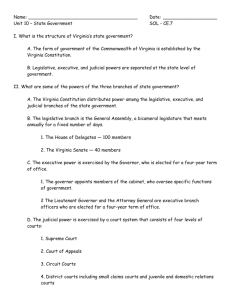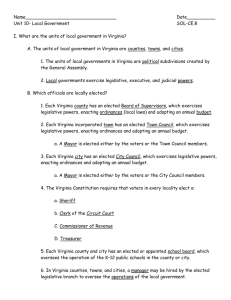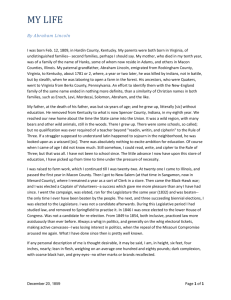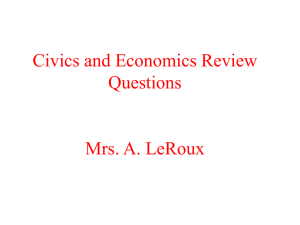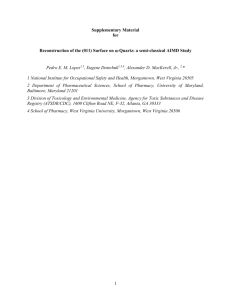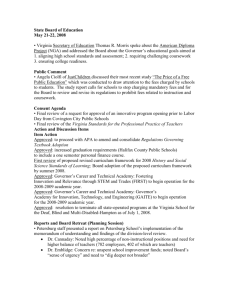Civics and Economics CE.7 Study Guide
advertisement
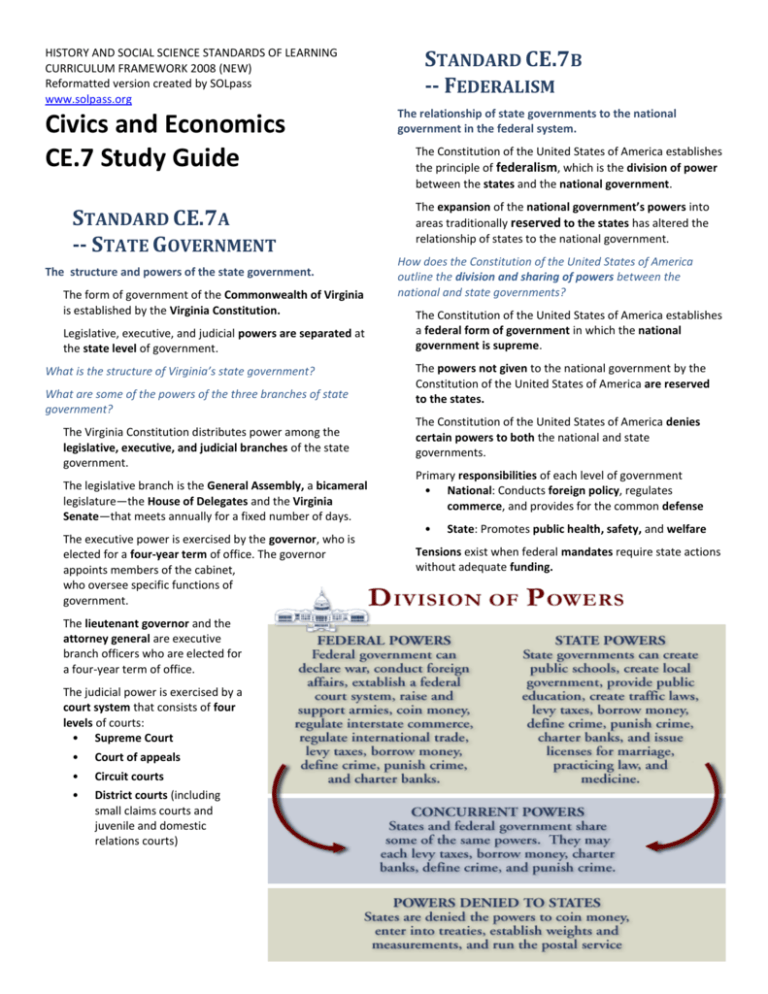
HISTORY AND SOCIAL SCIENCE STANDARDS OF LEARNING CURRICULUM FRAMEWORK 2008 (NEW) Reformatted version created by SOLpass www.solpass.org Civics and Economics CE.7 Study Guide STANDARD CE.7A -- STATE GOVERNMENT The structure and powers of the state government. The form of government of the Commonwealth of Virginia is established by the Virginia Constitution. Legislative, executive, and judicial powers are separated at the state level of government. What is the structure of Virginia’s state government? What are some of the powers of the three branches of state government? The Virginia Constitution distributes power among the legislative, executive, and judicial branches of the state government. The legislative branch is the General Assembly, a bicameral legislature—the House of Delegates and the Virginia Senate—that meets annually for a fixed number of days. The executive power is exercised by the governor, who is elected for a four-year term of office. The governor appoints members of the cabinet, who oversee specific functions of government. The lieutenant governor and the attorney general are executive branch officers who are elected for a four-year term of office. The judicial power is exercised by a court system that consists of four levels of courts: • Supreme Court • Court of appeals • Circuit courts • District courts (including small claims courts and juvenile and domestic relations courts) STANDARD CE.7B -- FEDERALISM The relationship of state governments to the national government in the federal system. The Constitution of the United States of America establishes the principle of federalism, which is the division of power between the states and the national government. The expansion of the national government’s powers into areas traditionally reserved to the states has altered the relationship of states to the national government. How does the Constitution of the United States of America outline the division and sharing of powers between the national and state governments? The Constitution of the United States of America establishes a federal form of government in which the national government is supreme. The powers not given to the national government by the Constitution of the United States of America are reserved to the states. The Constitution of the United States of America denies certain powers to both the national and state governments. Primary responsibilities of each level of government • National: Conducts foreign policy, regulates commerce, and provides for the common defense • State: Promotes public health, safety, and welfare Tensions exist when federal mandates require state actions without adequate funding. STANDARD CE.7C -- STATE LAWMAKING PROCESS STANDARD CE.7D -- STATE EXECUTIVE BRANCH The roles and powers of the state executive branch and regulatory boards. The executive branch of the Virginia state government enforces the laws and plays a key role in the policymaking process. The state lawmaking process. Members of the Virginia General Assembly are elected to make state laws. All citizens can learn the importance of the individual’s participation in the policymaking process through direct participation and simulations. Which branch of the Virginia state government has the power to pass laws? How does the Virginia General Assembly make laws? The lawmaking process in the Virginia General Assembly • Introducing a bill • Working in committees • Debating the bill on the floor of each house • Voting on the bill in each house • Sending the bill to the governor to sign into law Elected officials in the Virginia General Assembly write laws and take action in response to problems or issues. Individuals and interest groups help shape legislation. The primary issues in the legislative process at the state level • Education: To promote an informed and engaged citizenry (i.e., establish minimum standards for local schools) • Public health: To promote and protect the health of its citizens (i.e., fund health benefits) • Environment: To protect natural resources (i.e., improve water quality in the Chesapeake Bay) • State budget: To approve a biennial (two year) budget prepared by the governor • Revenue: To levy and collect taxes What are the roles and powers of the executive branch at the state level? The governor of Virginia exercises the formal powers granted by the Virginia Constitution. In carrying out both the formal and informal powers of the office, the governor fills several roles, including • chief of state • chief legislator • chief administrator • party chief • commander-in-chief. Cabinet secretaries and departments, agencies, commissions, and regulatory boards • administer laws • enforce laws • regulate aspects of business and the economy • provide services. HISTORY AND SOCIAL SCIENCE STANDARDS OF LEARNING CURRICULUM FRAMEWORK 2008 (NEW) Reformatted version created by SOLpass www.solpass.org Civics and Economics CE.8 Study Guide STANDARD CE.8A -- LOCAL GOVERNMENT The structure and powers of the local government. The units of local governments in Virginia are political subdivisions created by the General Assembly. What are the units of local government in Virginia? The units of local government in Virginia are counties, towns, and cities. Local governments exercise legislative, executive, and judicial powers. Each Virginia county has an elected board of supervisors, which exercises legislative powers, enacting ordinances (local laws) and adopting an annual budget. Each Virginia county and city has an elected or appointed school board, which oversees the operation of the K–12 public schools in the county or city. Each Virginia incorporated town has an elected town council, which exercises legislative powers, enacting ordinances and adopting an annual budget. A mayor is elected either by the voters or the town council members. Each Virginia city has an elected city council, which exercises legislative powers, enacting ordinances and adopting an annual budget. A mayor is elected either by the voters or the city council members. In Virginia counties, towns, and cities, a manager may be hired by the elected legislative branch to oversee the operations of the local government. In every Virginia locality, state courts resolve judicial disputes. Judges of the circuit courts, district courts, juvenile and domestic relations courts, and small claims courts hear cases in each locality. Which officials are locally elected? The Virginia Constitution requires that voters in every locality elect a sheriff, a clerk of the circuit court, a commissioner of revenue, and a treasurer. 1 Which powers do local government exercise? Virginia local governments exercise defined and limited powers, including the power to • enforce state and local laws • promote public health • protect public safety • educate children • protect the environment • regulate land use • levy and collect taxes. STANDARD CE.8B -- LOCAL VS. STATE GOVERNMENT The relationship of local government to the state government The authority of local governments in Virginia is derived from the state. What is the relationship between the state government and local governments in Virginia? All powers of local governments in Virginia are given to them by the Constitution of Virginia and acts of the General Assembly. Not all counties and cities are given the same powers. Cities have charters listing their powers. STANDARD CE.8C -- LOCAL LAWMAKING PROCESS The local lawmaking process Counties, cities, and towns adopt and enforce ordinances to provide services for their residents. All citizens can learn the importance of the individual’s participation in the policymaking process through direct participation and simulations. How do localities enact ordinances? An elected board of supervisors is the local legislative body in counties and is responsible for passing laws (ordinances) for the county. An elected council is the local legislative body in independent cities and incorporated towns. Individuals can have the greatest influence on the decisions made by local government officials.


